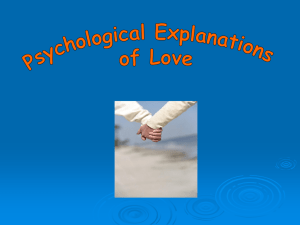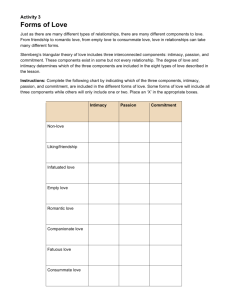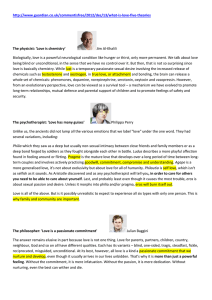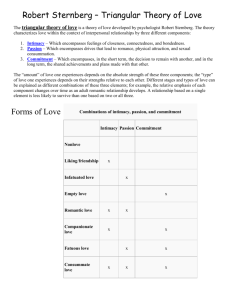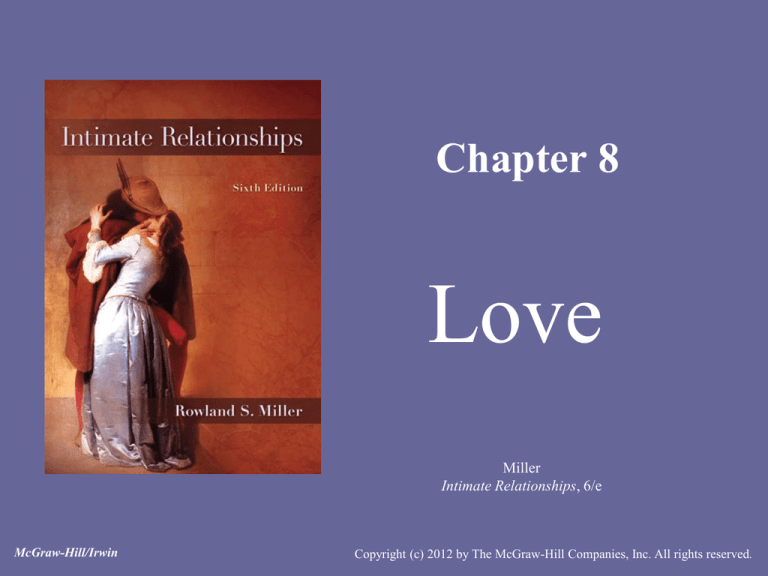
Chapter 8
Love
Miller
Intimate Relationships, 6/e
McGraw-Hill/Irwin
Copyright (c) 2012 by The McGraw-Hill Companies, Inc. All rights reserved.
A Brief History of Love
Different cultures have held very different views of love:
• Cultural value: Is love desirable or undesirable?
• Sexuality: Should love be sexual or nonsexual?
• Sexual orientation: Should love involve same-sex or
heterosexual partners?
• Marital status: Should we love our spouses, or is love
reserved for others?
8-2
A Brief History of Love
Only recently have (some) cultures come to
believe that love and marriage go together.
Today, the belief that romantic love is a reason to marry
is commonplace in North America…
…but it is still held in only some regions of the world.
8-3
Types of Love
The Triangular Theory of Love
Three different building blocks are presumed to
combine to form different types of love:
• Intimacy – feelings of warmth, understanding,
communication, support, and sharing
• Passion – emotional arousal and sexual desire
• Commitment – the decision to stay in a
relationship and to work to maintain it
8-4
Types of Love
The Triangular Theory of Love
Different mixtures of these components create different
experiences:
– Nonlove – intimacy, passion, and commitment are all
absent.
– Liking – high intimacy, but little passion or commitment.
– Infatuation – just passion.
– Empty love – commitment without intimacy or passion.
8-5
Types of Love
The Triangular Theory of Love
Things get more even interesting when two or more
components are combined:
– Romantic love – a combination of intimacy and passion.
– Companionate love – high intimacy and commitment, but little
passion.
– Fatuous love -- passion and commitment in the absence of
intimacy.
– Consummate love – intimacy, passion, and commitment are all
present to a substantial degree.
Evidently, various meanings may underlie the
expression, “I love you.”
8-6
Types of Love
Romantic, Passionate Love
Romantic love involves passion…
…and any form of strong arousal, pleasant or
unpleasant, can influence our feelings of romantic
love.
8-7
Types of Love
Romantic, Passionate Love
(a)
(b)
(c)
(d)
swaying on a spooky suspension bridge;
running in place for two minutes;
watching a disgusting movie; or
listening to a stand-up comedian
all increase men’s attraction to physically attractive women
who happen to be nearby.
8-8
Types of Love
Romantic, Passionate Love
Adrenaline fuels romantic love.
Various events that excite us may increase our love
for our partners.
8-9
Types of Love
Romantic, Passionate Love
Indeed, a two-factor theory of romantic love proposes
that such love results from:
(a) physiological arousal, paired with
(b) the belief that another person is the cause of your
arousal.
8-10
Types of Love
Romantic, Passionate Love
Some of the thoughts that underlie romantic love are apparent in
Rubin’s (1973) Love Scale that assesses:
– Intimacy: “I feel that I can confide in my partner
about virtually anything.”
– Dependence: “If I could never be with my partner, I
would be miserable.”
– Caring: “I would do almost anything for my partner.”
8-11
Types of Love
Romantic, Passionate Love
Romantic love is evidently a multifaceted experience
that involves both giving and taking.
8-12
Types of Love
Romantic, Passionate Love
In addition, “love is blind.”
When people feel romantic attraction to others, they tend to
underestimate or ignore those others’ faults.
8-13
Types of Love
Love is blind: When men expected to date a woman, they thought her lousy
work was better than it really was.
8-14
Types of Love
Companionate Love
As a combination of intimacy and commitment,
companionate love is a comfortable, affectionate,
trusting love based on friendship and companionship.
8-15
Types of Love
Companionate Love
After they have been married for many years, happy
couples tend to say:
“My spouse is my best friend,” and
“I like my spouse as a person.”
Long-lasting, satisfying marriages evidently include a
lot of companionate love.
8-16
Types of Love
Thus, there appear to be two major types of love that
occur frequently in American marriages:
– a love that’s full of passion that leads a couple to
marry, and
– a love thats full of friendship that underlies
marriages that last.
8-17
Types of Love
Styles of Loving
Another scheme (Lee, 1988) identifies another 6 types of love
experiences:
•
•
•
•
•
•
Eros – erotic love with a strong physical component
Ludus – playful and uncommitted; love is a game
Storge – love that emphasizes friendship and commitment
Mania – possessive, obsessive love that is full of fantasy
Agape – altruistic, selfless, dutiful love
Pragma – practical and pragmatic, dispassionate love
8-18
Types of Love
Styles of Loving
Men score higher on ludus than women do, and
women are more storgic and pragmatic than men.
These love styles allow researchers to fine-tune their analyses of
the diverse experiences people have with love.
8-19
Individual and Cultural
Differences in Love
Culture
Love is much the same around the world, but cultural
nuances exist.
8-20
Individual Differences in Love
Attachment Styles
Early studies demonstrated that people with secure
attachment styles experience more intimacy, passion,
and commitment than people with insecure or
avoidant styles do.
8-21
Individual Differences in Love
Attachment Styles
Which of these paragraphs best describe you?
•
“It is easy for me to become emotionally close to others. I am
comfortable depending on others and having others depend on
me. I don’t worry about being alone or having others not accept
me.”
•
“I want to be completely emotionally intimate with others, but I
often find that others are reluctant to get as close as I would like.
I am uncomfortable being without close relationships, but I
sometimes worry that others don’t value me as much as I value
8-22
them.”
Individual Differences in Love
Attachment Styles
•
“I am uncomfortable getting close to others. I want emotionally
close relationships, but I find it difficult to trust others
completely, or to depend on them. I worry that I will be hurt if I
allow myself to become too close to others.”
•
“I am comfortable without close emotional relationships. It is
very important to me to feel independent and self-sufficient,
and I prefer not to depend on others or to have others depend on
me.”
8-23
Individual Differences in Love
Attachment Styles
Two themes are now thought to underlie the four styles:
• Anxiety over abandonment – describing the worry that
others will find us unworthy and leave us, and
• Avoidance of intimacy – describing the ease and trust
with which we accept interdependent intimacy with
others
8-24
Individual Differences in Love
Attachment Styles
These themes influence important elements of interaction:
• Intimacy
• Passion
• Commitment
• Caring and Caregiving
A secure style is positively related to all four of these building
blocks. Secure people experience more intense romantic,
companionate, and compassionate love than insecure people do.
8-25
Individual Differences in Love
Attachment Styles
Importantly, the quality of our attachments can vary from
partner to partner.
We may be fairly secure in some of our relationships, but
relatively insecure in others.
8-26
Individual Differences in Love
Age
Most people mellow with age. Emotions are less intense,
and generally more positive.
The burning, urgent, intense emotions that lead young
people to marry seem to dwindle with time, being
replaced by a more genial outlook on love.
8-27
Individual Differences in Love
Men and Women
Men and women are more similar than different when it
comes to love.
However, men are more likely to believe in “love at first
sight,” and they want their loves to be passionate.
Women are more cautious and selective, and they feel
passion more slowly.
8-28
Does Love Last?
No.
Romantic love decreases after people marry.
8-29
Does Love Last?
After two years of marriage, average spouses express
affection for each other only half as often as they did
when they were newlyweds.
Divorces occur more frequently in the fourth year of
marriage than at any other time.
8-30
Does Love Last?
Why Doesn’t Romantic Love Last?
Perhaps we should expect romantic love to decline over
time.
• Fantasy enhances romance, but it erodes with time.
• Novelty adds excitement—and sexual arousal—to new
loves, but it fades with familiarity.
• Arousal fuels romance, but it, too, fades as time goes
by.
8-31
Does Love Last?
Consider the frequency with which couples share sexual intercourse (which is
one measure of passion). Passion clearly fades with time and experience.
8-32
Does Love Last?
So, What Does the Future Hold?
Often, the love that encourages people to marry is not
the love that keeps them together decades later.
Companionate love is more stable than romantic love is.
So, don’t be disappointed if your urgent desires gradually
resolve into more placid but deep affection for your
beloved. That happy result is likely to make you a lucky
lover.
8-33
For Your Consideration
Before David and Catherine met, neither of them had been in love, so they
were both excited when their dating relationship gradually developed into a
more intimate love affair. Each was the other’s first lover, and they found
sex to be both awkward and thrilling, and, within a few weeks, flushed with
more romantic feelings than either of them had known, they decided to
marry. But David soon became annoyed by Catherine’s apparent desire to
know everything about his day. She would call him every morning and
afternoon when he was at work, just to “be in touch,” and she would start
to fret if he met clients over lunch or was out of the office running errands.
For her part, Catherine was troubled by David’s apparent reluctance to tell
her what was on his mind. He prided himself on his self-sufficiency and
didn’t feel that it was necessary to tell her everything, and he began to feel
crowded by her insistent probing.
What do you think the future holds for David and Catherine? Why?
8-34

